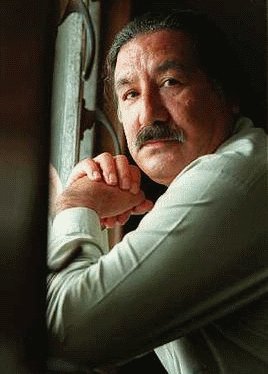In advance of Indigenous Peoples’ Day on Monday, October 9, House Natural Resources Committee Ranking Member Raúl M. Grijalva (D-Ariz.) on Friday led a bipartisan, bicameral letter signed by 33 members of Congress to President Joe Biden requesting clemency or compassionate release for renowned Native American activist Leonard Peltier, who has been imprisoned for nearly 50 years.

The lawmakers wrote, in part:
“As Members of Congress, we sign this letter with a deep commitment to the crucial role we play in upholding justice for all Americans – and to also hold our government accountable when we see a case of injustice, as demonstrated by the long incarceration of Leonard Peltier. We stand with the Tribal Nations of the United States, Indigenous voices worldwide, and leading voices on human rights and criminal justice around the globe in support of Mr. Peltier’s release.”
Peltier was convicted and sentenced to two life sentences in 1977 for the murders of Federal Bureau of Investigation (FBI) agents Ronald Williams and Jack Coler. The agents were killed on June 26, 1975 during a confrontation with members of the American Indian Movement (AIM) on the Pine Ridge Indian reservation in 1975.
His conviction followed a trial marked by procedural errors and a lack of evidence. As the authors note, “Over the course of his incarceration, particularly in recent years, key figures involved in Mr. Peltier’s prosecution have stepped forward to underscore the constitutional violations and prosecutorial misconduct that took place during the investigation and trial that led to his conviction.”
Civil rights leaders across America and around the world, from Nelson Mandela to the Dalai Lama to Rev. Jesse Jackson, have condemned the verdict as a miscarriage of justice—a miscarriage all too familiar to Indigenous peoples and marginalized communities.
Peltier is now 79 years-old and in deteriorating health, suffering from diabetes and hypertension, alongside other health issues. He has contracted COVID-19 several times since the beginning of the pandemic in March 2020.
CLICK HERE for the full letter. Full text can also be found below this release.
More Stories Like This
Native News Weekly (August 25, 2024): D.C. BriefsCheyenne River Youth Project to Celebrate Women’s Strength at Barbie-Themed Passion for Fashion on March 14
Celebrating Native American Women
Native Bidaské: The Illusion of Freedom and the Myth of America 250, Leonard Peltier Speaks Out
Monday Morning (March 2, 2026): Articles You May Have Missed This Past Weekend
Help us defend tribal sovereignty.
At Native News Online, our mission is rooted in telling the stories that strengthen sovereignty and uplift Indigenous voices — not just at year’s end, but every single day.
Because of your generosity last year, we were able to keep our reporters on the ground in tribal communities, at national gatherings and in the halls of Congress — covering the issues that matter most to Indian Country: sovereignty, culture, education, health and economic opportunity.
That support sustained us through a tough year in 2025. Now, as we look to the year ahead, we need your help right now to ensure warrior journalism remains strong — reporting that defends tribal sovereignty, amplifies Native truth, and holds power accountable.
 The stakes couldn't be higher. Your support keeps Native voices heard, Native stories told and Native sovereignty defended.
The stakes couldn't be higher. Your support keeps Native voices heard, Native stories told and Native sovereignty defended.
Stand with Warrior Journalism today.
Levi Rickert (Potawatomi), Editor & Publisher


